2022 new harvest – Update on Rishouen’s tea selection

It’s our pleasure that we can finally share our 2022 harvest tea selection with you.
As tea is a natural product, we cannot produce it in the exact same quality every year. Weather damage can be detrimental to tea trees. Especially frost in Spring damages tender new leaves, right before the harvest period. So tea producers put a lot of their efforts into protecting them from the damages.
Thankfully in Spring 2022, we had no big frost damage on the trees, but had a long chillly and rainy weather exceptional for the Sencha harvest time. It prevented the trees in some areas from absorbing much nutrients. However, all of our trusted farmers strived to produce the best quality teas and now we are honored that we are able to share their wonderful teas with you. We hope you could feel a strong passion of the tea producer and a taste of the fresh field through a cup of every tea.
2022 single field Uji teas grown in the Kyoto prefecture:
Hand Picked Gyokuro Gokou by Mr. Yoneda ―50g, 2,500 yen
Cultivar: Gokou – Location: Kyotanabe – Producer: Mr. Yoneda
Kyotanabe, in the Kyoto prefecture, is renowned for its production of high quality Uji Gyokuro revealing a deep umami mellow flavor.
The Gokou cultivar hails from the Kyoto prefecture. The shading of the fields before harvest to obtain umami-rich teas is a production method originating from Kyoto, so it is not a surprise that many of the varieties created in the Kyoto region are meant to be used for the production of shaded teas. (Gyokuro, Kabusecha, Tencha).
Within the varieties meant for shaded tea production, the Gokou variety is one of the cultivars offering the best results.
The Gyokuro produced by Mr. Yoneda is hand picked, meaning that only the most tender leaves are taken from the trees in spring to produce this tea. The tea trees are not trimmed to fit the shape of a harvesting machine: they grow freely (except for a trim made after the spring harvest) and are harvested only once a year. This means that both the producer and the trees give everything they have to produce the best quality tea each spring.
After infusion, this high end Uji Gyokuro reveals a wonderful fresh fragrance of ripe fruits typical of the Gokou cultivar. A few drops of its velvety light green liquor are enough to feel a firework of sensations, including refreshing floral notes and a deep, rich, yet elegant and not overpowering umami, lined with a light undercurrent of pleasing astringency in the finish.
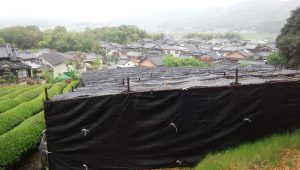
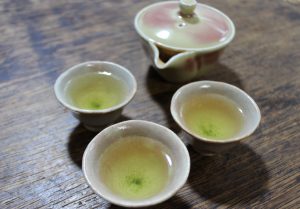
Gyokuro Gokou by Mr. Ookawa ―50g, 850 yen
Cultivar: Gokou – Location: Uji Tawara – Producer: Mr. Ookawa
Tana Oishitaen production method (undirect, one layer vinyl cover on a shelf supported by aluminum poles at about 2 meter from the ground). Mechanical harvest.
Uji Tawara is composed of hilly terrain which beneficiates from the proximity of the Uji river, and perfect climate for tea production. As such, Uji Tawara is one of the major Uji tea growing areas. This region is known for quality mechanically harvested Gyokuro.
Mr. Ookawa is a young producer working with his parents on their family estate.
This tea family has an original way to decide when to start shading the leaves: they add up the highest temperature of each day following the sprouting of new leaves in spring.
The time for harvest is also decided based on the temperatures during the first harvest season.
They unfold the vinyl cover that will shade the trees from direct sunlight when the total sum of highest temperature for each day after the appearance of the sprouts reaches 200 degrees.
The Gyokuro produced by the Ookawa family offers the fresh fruity fragrance typical of the Gokou cultivar, along with a full and supple liquor revealing an elegant umami, with a long finish.
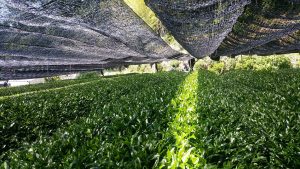
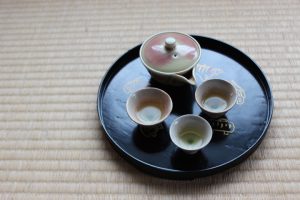
Sencha Saemidori by Mr. Minato ―50g, 1,750 yen
Cultivar: Saemidori – Location: Wazuka – Producer: Mr. Minato
Located in the Yamashiro region in the Kyoto prefecture, Wazuka is the chief Ujicha (Uji tea) production area, and the cradle of Japanese green tea culture. Nestled in sharply slanted hills, Wazuka town and its region enjoys an ideal climate & soil for tea production, and has been producing tea for 800 years, since the Japanese Kamakura era.
Mr. Minato is a young producer in his thirties, who works tirelessly with his father on their estate in Wazuka.
Talking to Mr. Minato, our tea master & tea buyer, Naoki, had a deep impression of his passionate efforts to growing the best quality tea possible, as Mr. Minato repeats actions meant to prepare for the Shincha season 3 or 4 times, when these steps are usually only taken once. This is very time consuming, but, on this subject, Mr. Minato says that ‘if it that can help make the final result even just a little better it is worth it’.
As this tea is not a blend, the olive green leaves reveal the undiluted message of the cultivar, the soil and Mr. Minato’s efforts as a producer.
Upon infusion, the liquor reveals a mellow flavor due to its cultivar — the Saemidori cultivar is known for its umami and reduced astringency– & the fact that the field has been shaded from the sun 9 days before harvest. (Not a direct cover, shading on a shelf).
The first infusion yields a deep vegetal umami (fresh steamed spinach notes) and appetizing fragrance of young greens, almost devoid of astringency in spite of the fact that the leaves were harvested only a few days ago.
The second infusion delivers delicate green notes, revealing more of the Shincha invigorating flavor, but on a pleasant, reduced level. A long finish with a hint of astringency will tickle the tongue after drinking.
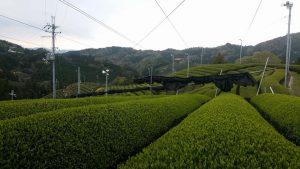
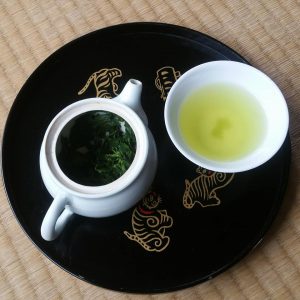
Sencha Yabukita Kin Jirushi ―50g, 1,450 yen
Cultivar: Yabukita – Location: Harayama – Producer: Mr. Tsuji
This specialty tea composed of leaves of the Yabukita cultivar was grown for us in a single field by Mr. Tsuji in Harayama – a sharp hilled district in Wazuka known for producing some of the best Sencha of the Kyoto region.
The field yielding the Sencha Yabukita Kin Jirushi is situated at a 200 m altitude on an ideal tea producing location on a riverside, at the bottom of a ravine. The difference in the temperature between day and night shapes mellow flavored teas. (Our tea master asked Mr. Tsuji to shade the field 5 days before harvest to emphasize the mellow character of the tea). The field is also exposed to reduced hours of sunlight and to stagnant cold air and fog emanating from the nearby river, so the leaves grow slowly and stay very tender until harvest time. Red clay soil which retains nutrients well provides the leaves of the Sencha Yabukita Kin Jirushi with a full bodied flavor. The young leaves offer a sweet after taste, and a clear, refreshing fragrance opens up in the back of the nose in a nice retro nasal olfaction effect.
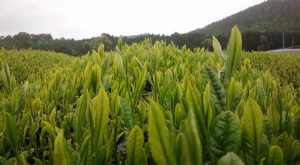
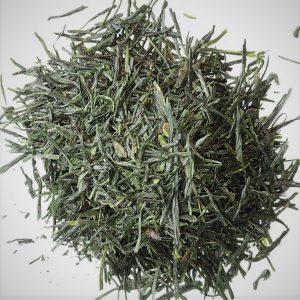
Pure Sencha Yabukita ―50g, 800 yen
Cultivar: Yabukita – Location: Harayama – Producer: Mr. Tsuji
This tea is grown on a steep slope facing south by Mr. Tsuji in Harayama.
The terrain in Harayama contains rock conglomerates rich in minerals, which, absorbed by the tea trees, offer a crisp, sweet fragrance to the leaves. Furthermore, the black soil in this location retains fertilizers well, allowing the leaves to offer a deep flavor lasting well from one infusion to the next.
This is a ‘pure’ Sencha composed of leaves grown traditionally in full sunlight without any shading period of the field before harvest. revealing the nostalgic and rejuvenating sensations offered by traditional Uji Sencha, along with the refreshing fragrance offered by pure Sencha grown in Harayama.
Sencha Okumidori by Mr.Yuki ―50g, 700 yen
Cultivar: Okumidori – Location: Dosenbo – Producer: Mr. Yuki
This tea produced by Mr. Yuki at 500m altitude on the Dosenbo plateau in the Kyoto prefecture is an authentic Uji Sencha grown in full sunlight without any shading period before harvest according to a traditional production method that is on the verge of disappearing in Japan. This is also a Sencha represents the undiluted message from the terroir of its growing location: its leaves of the Okumidori cultivar have all been harvested from a single field benefiting from a sandy soil, a feature allowing for good water drainage and a deep penetration of the tree roots. As a result, the leaves yield a neat, richly nuanced flavor after infusion. Registered in 1947, the Okumidori cultivar is known to produce mellow, high quality Sencha devoid of bitterness. The high elevation of the Dosenbo plateau emphasizes the natural smoothness of the Okumidori cultivar, especially, the differences of the temperature between night and day result in an accumulation of sweet components in the leaves. Before infusion, the leaves offer a fresh fragrance of aromatic herbs. After infusion, the liquor offers a flowery, vanilla like fragrance. At first the mouthfeel is velvety sweet, without bitterness. This mellow first sensation is then balanced with a light and refreshing astringency blooming in a long finish. This full bodied tea will offer deliciously fruity tannic notes at higher temperatures. Its savor will hold and change pleasantly from one infusion to the next.
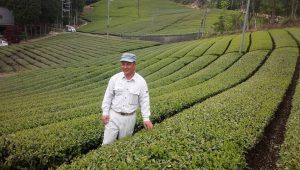
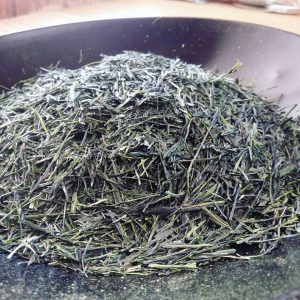
Sencha Ujimidori ―50g, 700 yen
Cultivar: Ujimidori – Location: Wazuka – Producer: Mr. Kubomi
Sweet and round liquor delivers cinnamon, vanilla like flavor and a lovely subtle bitterness. You could brew the tea whether in our recommend method or at high temperature.
Z1 by Mr. Tamura ―50g, 630 yen
Cultivar: Z1 – Location: Wazuka – Producer: Mr. Tamura
Mr. Tamura over the age of 90 still works in his fields with his wife and daughter, on the top of high hills with steep slopes.
Sencha Z1 is a rare cultivar that is very little used by producers in Japan because it is difficult to make a balanced tea with this cultivar. It has kept its laboratory name, and it has not been given a definitive name as a cultivar. Mr. Tamura makes his tea to perfection and the liquor offers the sweet, round flavor and rich in iodized Umami, combined with a slight astringency typical of this cultivar. The leaves are cultivated pesticide-free from autumn to the harvesttime and covered for about 10 days before harvest. This shading process contributes to the Umami. Subsequent infusions (2-3) offer a refreshing floral fragrance.
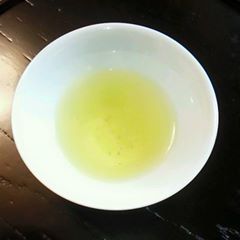
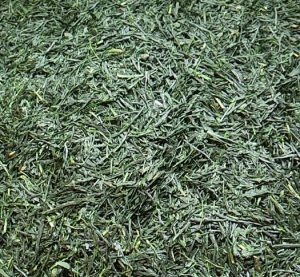
Please feel free to email us at info@rishouentea.com for an order✉